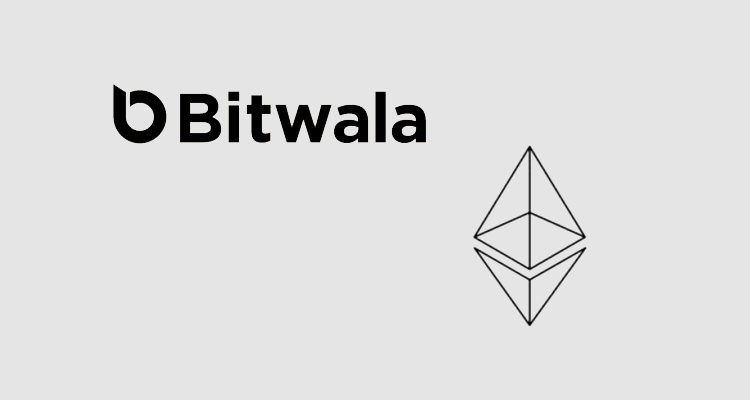Bitwala, a Berlin-based cryptocurrency banking service, today announced it now offers its users the ability to trade Ether (ETH), the cryptocurrency of the Ethereum network. ETH is the world’s leading programmable blockchain and the second largest cryptocurrency by market capitalization, after Bitcoin.
Residents in 31 European countries (EEA) are eligible to trade ETH against the Euro starting today. Customers can trade Ether directly out of the Bitwala bank account. Trading against the Euro only costs a competitive 1 percent fee.
Ethereum
Ethereum is a mainstay of the web 3.0 economy. It is the driving force of the decentralized finance (DeFi) revolution, aiming to transform conventional financial markets. The open-source Ethereum Blockchain allows to write immutable software code controlling digital value exchange.
Such decentralized Apps (dApps) are finding application in many industries ranging from insurance products, supply-chain logistics and financial services. Decentralized finance is the application of blockchain based smart contracts to financial products, such as assets, currencies or loans, with the goal of making units of value such as stocks, real estate or currencies more accessible, tradable and efficient.
“With the addition of Ether trading, we are opening a new gateway to interact with the web 3.0 – the growing digital economy spreading across the globe. Thanks to our top-of-class legal and technical safeguards, you do not need to be a blockchain expert to start getting involved in this exciting market. We are seeing great progress across Europe. We particularly welcome the Merkel administration’s national Blockchain Strategy, which has been passed recently.”
– Ben Jones, CEO of Bitwala GmbH
DeFi protocols and services are gaining popularity in the crypto space, where they prove to be a real alternative to the conventional financial system. Europe is gradually opening up to the idea of cryptocurrencies and DeFi products. Recently, Germany’s Merkel administration set out the course for the token economy with its national Blockchain Strategy. Bitwala welcomes this and will carefully assess the introduction of all regulatory compliant DeFi products based on Ethereum over the course of 2020.
“In contrast to crypto exchanges, it is Bitwala’s policy to make blockchain-enabled finance easily accessible for everyone. Together, Bitcoin and Ether, the only two cryptocurrencies Bitwala is currently supporting, account for about 70% of the market capitalization of all cryptocurrencies. They also show strong liquidity and are therefore more resistant to volatility than coins that show low liquidity and a smaller market cap.”
– Philipp Beer, Chief Growth Officer at Bitwala
Bitwala: Setup for the European Economic Area
With retail customers in 31 European countries, Bitwala offers users based in the European Economic Area a free current account offering with built-in crypto wallets as well as seamless trading options. Bitwala now enables its customers to trade Bitcoin and Ether directly out of a current account, hosted by Berlin-based solarisBank.
When customers set up an Ethereum wallet, a cryptographic key is generated and locked away in a specific smartphone security module (hardware-based key manager). It can only be accessed by the Bitwala mobile app, and only when the phone is unlocked. Every transaction requires a confirmation from the device’s key and the user via PIN, Face ID or Fingerprint, meaning no one else can access the Ether funds – not even the Bitwala team.
If customers lose their device, and as a result lose access to their Ethereum wallet via the Bitwala app, they still have a way of recovering their Ether: the wallet backup. It is important to point out that only the customer, not Bitwala, knows the details needed for the wallet backup. It is therefore of high importance to store the wallet backup safely and offline on a piece of paper.
Ethereum-ready wallets can be generated by iPhones models 5 or higher with Secure Enclave (with Touch ID or Face ID supported) or Android devices SDK Level 23 or higher (with Secure Element or Strongbox and Fingerprint only. Face recognition is not supported).
